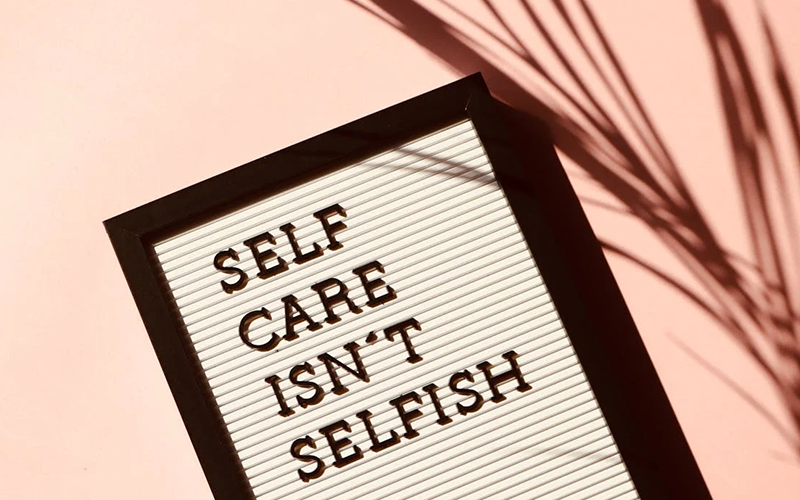There are many, if not a million, ways to take care of your mental health — and if you surf the net, everyone swears by their own strategies. Some will say that hiking is a cure for when you’re feeling low, and others say that a pint of ice cream at midnight will do the trick. This probably has more to do with individual preferences than hard cold facts, although don’t get me wrong: science could be backing up some of these self-care strategies.
In this specific blog, however, I wanted to take a moment to appreciate some of the strategies that have helped my mental health thrive; I discovered some by trial and error, while others were suggested by professionals.
1. Can never go wrong with water
Remembering to drink enough water in a day is important for your physical and mental health. As you might know, your body is largely composed of water, so drinking a healthy amount every day will greatly benefit you. I found that when I increase my water intake, I tend to have more energy and a better mood throughout the day, and I experience less mental fog when working on tasks.
Bonus: There isn’t a sugar crash with drinking water either.
Caveat: Do not try to drink a ton of water in one go. On days when I do it suddenly, I tend to feel a little nauseous afterwards. Go slow and ease yourself into drinking a healthy amount of water (which varies between people).
2. Enjoy a scenery change
Another healthy life strategy is to make time for small changes. I cannot speak for everyone, but on days when I am stuck with one scenery/view for a long time, I become mentally drained and my productivity tanks. Too much of one thing can be bad for you, so being mindful of changing your view every so often is necessary for your mental health.
I find that this happens to me when I am at work, stuck at my computer station, or at home when it’s my day-off. Recently, I have adopted the practice of leaving my station behind in the main room and taking my breaks outside on the building balcony. This helps me with mentally separating my work space from my rest space while allowing me the chance to get some fresh air and a change of scenery.
Bonus: Enjoy the scenery change with a walk (indoors or outdoors) to get the blood pumping throughout your body.
Caveat: This might not be doable sometimes because of the weather, limited space, or mental and/or physical energy.
3. Call a friend
For me, connecting with my friends is probably the most powerful self-care strategy I have in my toolkit. After a hard day at work or school, venting/chatting with a loved one is important for feeling heard and loved. This aligns well with research behind Self-Determination Theory by Ryan and Deci (2000) because they discovered 3 innate, psychological needs necessary for optimal human functioning; essentially, for optimal functioning, each individuals needs to feel confident with their skills (competent), have free-will (autonomy), and feel a sense of belonging/connectedness with others (relatedness).
Calling a friend helps me feel connected and validated, so I treasure those late night chats where we may or may not have things to talk about. Sometimes, the idea of knowing someone is there with you in the moment is all that’s needed.
Bonus: Do group Facetime/video calls and play online games together.
Caveat: It can be tough to make the time to connect with others, and schedules might not align.
4. Nap Away (Catch some zzZ’s)
Sometimes extra sleep is just needed. Whether it was because of a restless night or a chaotic day with many things to do, squeezing in a short 10-15 minute nap somewhere can work wonders for your mental health.
Sleep is needed for improving cognition (e.g. storage information, forming memories etc) as I learned in many previous psychology courses. After a particularly busy morning shift at work, I tend to need a nap in order for me to enjoy my evening and night plans. A lack of sleep can hinder your ability to function as I’m sure many of you readers can agree and probably can recall a past experience where that was the case. Many of you might also relate to when I say, ‘you aren’t you when you’re tired’.
Bonus: It can be easy to nap anywhere (usually).
Caveat: Might mess with your nighttime sleep schedule if you’re not careful.
5. Journaling/Writing
Many people have recommended this strategy for a number of reasons, but for me, I enjoy the opportunity of bringing out everything that is going on inside in my head. Carrying stuff around all the time is exhausting, and sometimes, it’s tiring to even talk about it with others. Journaling/writing is a silent and individual task, and you can do it however you want, like in the form of a poem, story, or diary entry. With that said, it doesn’t have to be the best piece of work you’ve ever written. There is no pressure, and that’s the beauty of it.
Bonus: It’s an easy task to do anywhere. Got a pen and no notebook? No problem, napkins can get the job done in the worse-case scenario.
Caveat: You might get tired of the writing if you’ve been working on other similar tasks beforehand, like creating a work report or school assignment.
Again, these are just some strategies that I have picked up in the last few years and have been helpful for me. Will these work for you? I can’t guarantee, but you won’t know unless you don’t try.
Reference
Ryan, R. M., & Deci, E. L. (2000). Self-Determination Theory and the Facilitation of Intrinsic Motivation, Social Development, and Well-Being. American Psychologist, 55, 68-78.
Image courtesy of Pexels.com
Note: The Free Your Mind Mental Health Society is an independent youth-led organization. The contents of this blog are not intended to be a substitute for professional medical advice, diagnosis, or treatment. Always seek the advice of your physician or another qualified health provider with any questions you may have regarding a medical condition. In the event of a medical emergency, please call your doctor or 911 or other local emergency numbers immediately.




